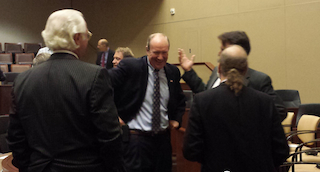Internationally recognized privacy and national security experts came to St. Thomas Thursday for a roundtable debate covering the National Security Agency hot topics.
Over the course of two hours, moderator Don Shelby, former WCCO-TV anchor and radio host, prompted panel members Marc Rotenberg, Steven Bradbury, Bruce Schneier and Andrew McCarthy. Law students, professors, alumni and members of the public were in Schulze Hall to hear the discourse that some said kept the audience’s attention.
“It’s like you can hear a pin drop anywhere,” alumnus Brandan Borgos said.
The audience submitted questions, and Shelby noted that there were several Snowden questions—too many to read them all. Although the Snowden situation evoked disagreement among the panelists, they acknowledged that without him leaking some top-secret information he learned while working at the NSA, there would be no debate at all.

One of the night’s most heated questions concerned the possible consequences and dangers of collecting telephone data.
Rotenberg, president and executive director of the Electronic Privacy Information Center, graduate of Stanford Law School and law professor at Georgetown, objected to such data collection.
“The intrusion may be greater with the collection and use of telephone records than it could be on listening in to telephone calls,” Rotenberg said.
Bradbury, who formerly headed the Office of Legal Counsel for the Department of Justice in Washington, D.C. and served as an adviser to the president, disagreed.
“They have it today just about right, the needle that balances between privacy and national security … is pretty much in the exact right place,” Bradbury said. “The NSA is not the enemy of the American people.”
Schneier, a security technologist, journalist and blogger, was also a former NSA leader, and said this surveillance might have prevented the Sept. 11 attacks.
“I’m thinking, you missed the Boston bombers,” Schneier said. “I’m not convinced … we learned that the government knew about the Syrian chemical attacks three days before they occurred … maybe the secret of how we knew it was more valuable than acting on the knowledge,” Schneier said.
Borgos enjoyed hearing the four tackle the issues.
“When they get their heads together and decide to tackle an issue, it’s always on the edge.” Borgos said.
McCarthy brought his experience as an assistant U.S. attorney to the discussion. In his 18 years as a federal prosecutor, McCarthy was involved in several major terrorism cases, including the successful prosecution of the 12 members who conducted the 1993 World Trade Center bombing.
“This is not essentially a legal issue, it’s a political issue,” McCarthy said. “There’s a certain threshold of constitutional protection. After that, we rely on the representatives of the people to set the right balance between liberty and security depending on what our threat environment is at the time.”
Despite high tensions, Rotenberg noted the evening’s success.
“I think it’s been a great discussion,” Rotenberg said. “I don’t know if we’re ready for a group hug exactly.”
Law student Austin Bowyer said he would continue to contemplate the points brought up over the evening.
“There were some really good points brought up by both sides that as (host) Hank Shea said at the end, ‘We have a lot to think about and interpret,’ because this discussion isn’t going to end now,” Boyer said.
Borgos thought it was “a massive accomplishment” to have the four experts at St. Thomas for the debate.
“Hearing Steve Bradbury talk about how the government actually operates was eye-opening,” Borgos said.
Joey Anderson can be reached at ande9008@stthomas.edu.
